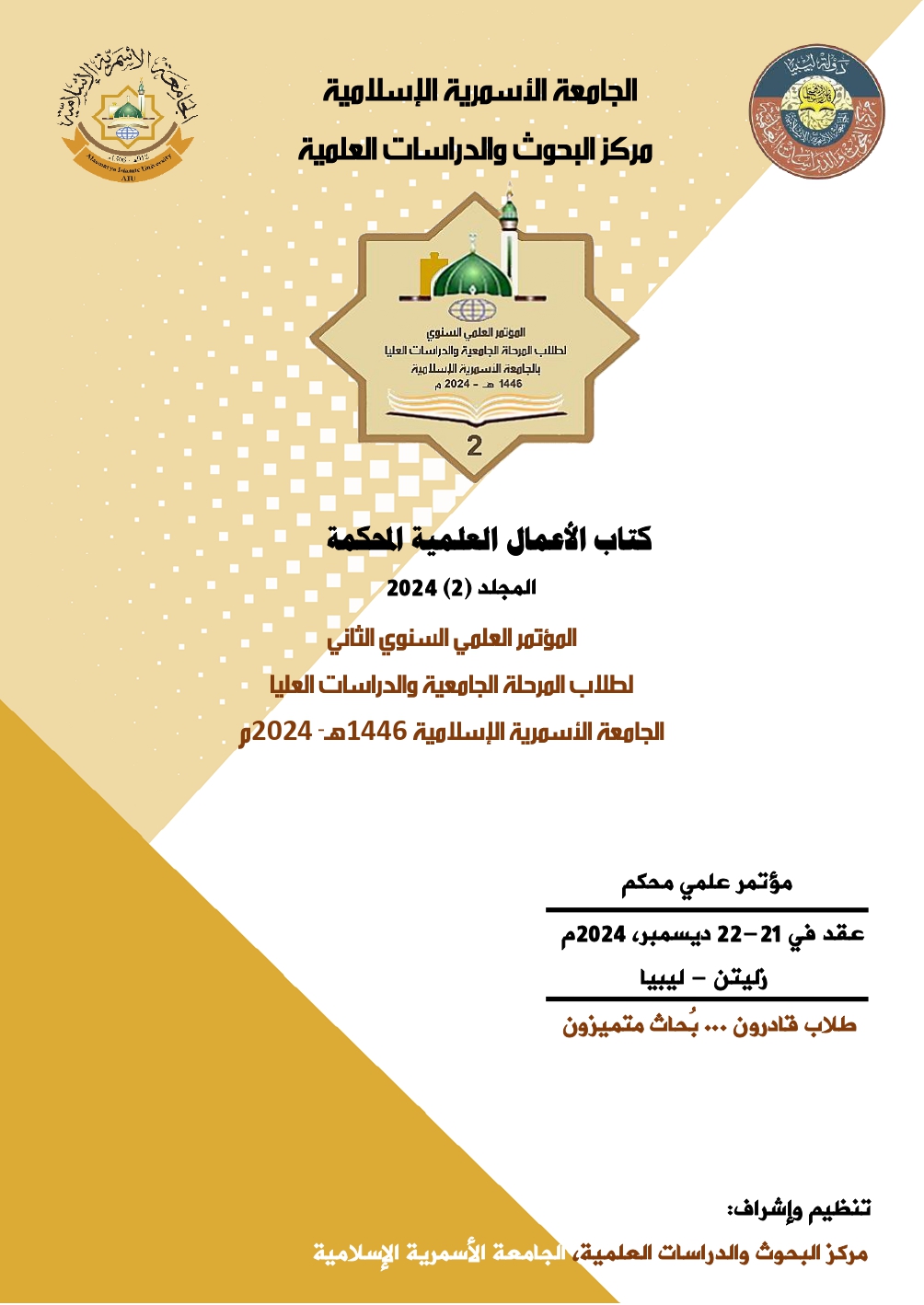مستويات الاستقلالية في التعلم: دراسة مقارنة بين الطلاب الجدد والطلاب في السنة النهائية في كلية العلوم الإنسانية
الكلمات المفتاحية:
التعلم المستقل، الاستقلالية، ليبيا، المرحلة الجامعيةالملخص
تهدف هذه الدراسة إلى قياس ومقارنة مستويات الاستقلالية بين طلاب السنة الأولى وطلاب السنة النهائية في كلية العلوم الإنسانية، للبنات بالجامعة الأسمرية الإسلامية. تم استخدام منهج كمي لتقييم الفروق وأهمية مستويات الاستقلالية باستخدام اختبار استقلالية المتعلمين المقتبس من (Dafei, 2007) لجمع البيانات. أشارت النتائج إلى أن طلاب السنة الأولى أظهروا مستويات استقلالية أعلى من طلاب السنة النهائية، بثقة بلغت 90%. ومع ذلك، قد لا يكون هذا الفرق ذا دلالة إحصائية عند استخدام مستويات دلالة أكثر صرامة. هناك حاجة إلى مزيد من البحث لاستكشاف أسباب هذا الفرق.
التنزيلات
المراجع
Al-Araibi, A. B., & Saleh, A. M. (2020). An investigation into the use of learning autonomy in the Libyan ELT context and its impact on the learners’ learning behavior: A case study conducted in a high school in Ajdabiya and the Department of English at the University of Ajdabiya. ElManarah Scientific Journal, 1(1), 96-109.
Balçikanli, C. (2008). Fostering learner autonomy in EFL classrooms: Increasing learner autonomy in English as a foreign language classroom. Kastamonu Education Journal, 16(1), 277-284.
Benson, P., & Voller, P. (2014). Autonomy and independence in language learning. In: Autonomy and independence in language learning, pp. 1-12. Routledge.
Chaffee, K. E., Lou, N. M., Noels, K. A., & Katz, J. W. (2020). Why don’t “real men” learn languages? Masculinity threat and gender ideology suppress men’s language learning motivation. Group Processes & Intergroup Relations, 23(2), 301-318.
Dafei, D. (2007). An exploration of the relationship between learner autonomy and English proficiency. Asian EFL Journal, 24(4), 24–34.
Dam, L. (1990). Learner Autonomy 3: From Theory to Classroom Practice. Dublin: Authentik.
Deci, E. L., & Ryan, R. M. (1985a). Intrinsic motivation and self-determination in human behavior. Springer Science & Business Media.
Deci, E. L., & Ryan, R. M. (1985b). The general causality orientations scale: Self-determination in personality. Journal of Research in Personality, 19(2), 109–134.
Elmahjoub, A. (2014). An Ethnographic Investigation into Teachers’ and Learners’ Perceptions and Practices in Relation to Learner Autonomy in a Secondary School in Libya. Doctoral dissertation, University of Sheffield.
Garita, C. O., & Elizondo, L. B. (2013). A closer look into learner autonomy in the EFL classroom. Revista de Lenguas Modernas, 19. 325-343
Harmer, J. (1983). The Practice of English Language Teaching. Longman, London.
Hu, P., & Zhang, J. (2017). A pathway to learner autonomy: A self-determination theory perspective. Asia Pacific Education Review, 18(1), 147–157.
Khalifa, S., & Shabdin, A. (2016). Autonomy in vocabulary learning: Vocabulary learning strategies teaching programme for EFL Libyan learners. Arab World English Journal, 7(1), 140–159.
Little, D. (1990). Autonomy in Language Learning. In: Autonomy in Language Learning. I. Gathercole (Ed.). CILT, London.
McEown, M. S., & Oga-Baldwin, W. Q. (2019). Self-determination for all language learners: New applications for formal language education. System, 86, 102124.
Mohammadi, M., & Mahdivand, Z. (2019). Is willingness to communicate a reliable predictor of learner autonomy in an EFL context? Center for Educational Policy Studies Journal, 9(1), 9–26.
Myartawan, I. P. N. W., & Latief, M. A. (2013). The correlation between learner autonomy and English proficiency of Indonesian EFL college learners. TEFLIN Journal, 24(1), 63.
Suwaed, H. (2023). An investigation of Libyan EFL postgraduate students’ attitudes towards learner autonomy. Sabratha University Scientific Journal, 7(14), 282-296.
التنزيلات
منشور
إصدار
القسم
الرخصة

هذا العمل مرخص بموجب Creative Commons Attribution-NonCommercial-NoDerivatives 4.0 International License.





